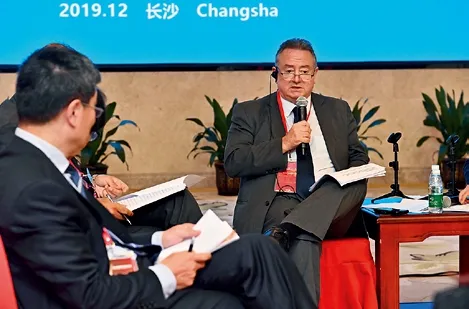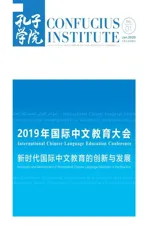国际中文教育政策
2020-04-22
来自美国、韩国、日本、保加利亚、巴基斯坦、新西兰、土耳其等国高校、孔子学院(孔子课堂)的代表以及专家学者作了专题发言。吸引了900 多人次参加。
工作坊1. 国际中文教育的机遇与挑战
与会代表普遍认为,促进国际中文教育发展,政策应先行,保障需到位。天津师范大学校长钟英华表示,国际中文教育面向的对象是普通大众而不是少数精英,大众的需求决定了国际中文教育的命运,也决定了孔子学院的命运,因此相关政策的制定应当针对大众的需求。新西兰奥克兰孔子学院院长姚载瑜表示,国家语言政策、师资保障和学生的内在需求是决定国际中文教育发展的三个要素,世界上不少国家对于汉语的政策并不能满足实际需求,而孔子学院正填补了这一空白。
英国哈德斯菲尔德大学校长鲍勃·克莱恩认为,当下英国乃至整个欧洲的外语教育形势已经发生了变化,汉语已经成为学习需求最大的外语语种,并且与学生的职业发展密切相关。日本福山大学校长冨士彰夫以日本福山地区为例,指出当地企业与中国企业交流合作的发展带来了对汉语人才的需求,中文教育迎来了良好的发展时机。巴基斯坦伊斯兰堡国立现代语言大学校长穆罕默德·加法尔认为,学习中文的人越来越多,“一带一路”倡议和“中巴经济走廊”机制为相关国家的中文学习提供了一个良好契机,而要实现与中国有效的交流合作,学习中文的同时更要学习中国的文化。
保加利亚大特尔诺沃大学东亚中心主任波丽娜·东切娃认为,师资质量是保障教学质量的先决条件,但目前较多孔院面临的问题就是师资的匮乏,在孔子学院总部派出中文教师和志愿者的同时,外方承办单位也应积极探索培养本地师资的途径。在考试方面,汉语已成为保加利亚的大学考试科目之一,服务对象由社区扩大到全国,于此之际,孔子学院大有可为。华东理工大学校长曲景平认为,在新媒体、新传播模式高度发展的今天,国际中文教育应从培养新型师资、探索新教学法和利用新传媒技术三个方面来提高办学质量。
工作坊2.各国中文教育政策与实践
英国苏格兰中小学孔子学院院长林凡表示,苏格兰中小学孔子学院成立于2007 年,至今已下设44 个孔子课堂。孔子学院发展过程中得到了苏格兰政府的政策和资金支持,并与天津市教委建立了良好的合作关系,出版了适合当地的中文教材。目前在苏格兰已有400 多所学校加入中文项目,数千名学生在学习中文,同时在戏剧、音乐、体育等课程中也融入了中文的教育。自2009 年开始,中文被纳入英国高考,除了母语以外,很多学生从小学一年级就可开始学习中文,一直到中学,在这个过程中中文教育得到了很大程度的普及,也使很多当地人受益。苏格兰的中文教育已有20 多年的历史,一些年轻人通过学习中文获得了成功,并给其他人树立了榜样。很多年轻人都看到,很多行业对中文人才的需求日益增加,使他们的未来更加光明。为落实教育机会的公平化,苏格兰政府和孔子学院都开设了中文网络课程,以保证所有有意愿的人都能够有机会学习中文。
孟加拉南北大学校长Atiqul Islam,孟加拉国对中文人才的需求非常旺盛,每年新增中文学习人数至少5000 名。而目前中文教师数量不足,特别是本土教师。尼日利亚纳姆迪•阿齐克韦大学校长Charles Okechukwu Esimone :尼日利亚人口超过2 亿,是非洲人口最多的国家,存在着巨大的就业压力,很多学生将学习中文作为增强职场竞争力的有效方法。孔子学院的中文课程已被纳入纳姆迪•阿齐克韦大学的必修课,在尼日利亚很多中小学和大学都将中文纳入必修课。
意大利罗马大学孔子学院中方院长张红介绍,中文在欧盟国家一般来说都作为选修课。意大利罗马国立住读学校国际理科高中自2010 年坚持将中文作为核心课程,用中文教授中国历史和地理。中文不仅是学习的课程也成为了学习的工具。这个项目6 年多来培养了300 多名毕业生,这些学生不仅精通中文,而且了解世界。意大利自2014年推动了全国性中文教育新政,将中文纳入意大利高考。2016 年中文教师进入公务员体系,并颁布高中中文教育大纲,着手编写大纲配套教材。白俄罗斯巴洛诺维奇大学副校长Klimuk Vladmir 表示巴大已于2017 年开设中文研究中心,计划今年开设孔子课堂,从而为大学生提供中文语言学习和中国文化培训的平台,以实现各领域的互鉴,增强两国合作,实现共同发展。


工作坊3. 中文教育发展与高校国际化
与会代表一致认为,中文教育在大学国际化战略中起着至关重要的作用。中国首都师范大学副校长李小娟认为,中文教育是大学国际化的窗口,助力大学的国际化布局和专业教育的国际化。智利边境大学校长埃杜尔多认为,中文教育将遥远的文化联系在一起,有助于拓宽师生的国际化视野,提升其跨文化交际能力和个人竞争力。
美国纽约州立布法罗大学副校长约翰表示,该校多年来重视中文教育开展,与中国多所高校和教育部门建立了紧密的合作关系,建立教师资格认证体系,帮助当地中小学开设中文课程,大学的发展和学生的成长都从中受益。拉脱维亚大学孔子学院院长贝德高表示,大学早在1993年起开设中文专业,并在孔子学院的协助下完善了专业建设和师资培训,编写了丰富的符合当地需求的本土教材。
英国伦敦玛丽女王大学孔子学院院长凯瑟琳表示,由于外派教师签署的是短期合同,难以长期教授大学的学位课程,希望确保稳定的教学质量。浙江师范大学校长郑孟状表示,中文教育建设仍需注重顶层设计,注重队伍建设。暨南大学校长宋献忠表示,要以世界眼光、国际视野来思考中文教育问题,
工作坊4. 中外合作开展中文教育的新途径
江西师范大学校长梅国平提出,探索中外合作开展中文教育新形式,要做好“加减乘除”法。即“汉语+”项目,拓展课程方案;做好“减法”,注重课程从“求数量”到“重质量”转变;把握“乘法”,加强与境外机构合作,充分发挥市场机制作用,推动中文纳入所在国课程体系;利用“除法”,根据相关政策指导,完善中外合作开展中文教育体制机制。美国瓦尔普莱索大学副校长理查德·安德鲁·阿姆赖因介绍了大学利用音乐特色办学优势,推动孔子学院及其周边中小学孔子课堂建设,促进周边地区中文和中国文化学习交流经验。埃塞俄比亚职业教育培训学院行政副校长哈彼特伍德·海路·达巴指出,中文教育应结合当地企业对人才的需求,定制化开设专业中文课程。蒙古国立大学前校长孟和巴特指出,为保证中文教育实现可持续发展,需通过校企合作或基金会方式多渠道解决资金支持问题。重庆师范大学校长孟东方强调,应充分发挥孔子学院联盟及孔子学院校友会优势,初步建立协同发展机制,丰富校企合作方式,韩国国立济州大学校长宋锡彦建议扩大中文教育目标,支持华裔儿童学习中文;线下培训与线上学习相结合,重点推广网上中文课程;通过分享文化体验增强中文课程学习兴趣。三峡大学校长何伟军建议积极探索中文教育推广“走出去”与国外优质预科生源“引进来”新模式,为促进中外民心相通贡献力量。
山东大学孔子学院研究中心主任宁继鸣提出,国际中文教育的最终目的应该是形成和谐的中文教育系统,即在孔子学院基础和框架上更多服务并发展社区教育、中小学教育以及其他中文教育。海地基斯奎亚大学校长杰基·卢马克(Jacky Lumarque)强调,要尊重文化多样性和差异性,寻求共同发展之路。语言学习不仅是为了语言本身,更是为了增进各国人民友谊并推动文化、教育经济等领域的交流与合作。英国格拉斯哥大学孔子学院外方院长吴南森(Nathan Woolley)表示,中文是个有效的联系工具,中外合作主体应在文化、历史、政治、哲学、医学、工程等方面多做有益尝试,努力挖掘中文教育的全部潜力。

Representatives, experts and scholars of colleges and universities and Confucius Institutes (Confucius Classrooms)from the U.S., South Korea, Japan, Bulgaria, Pakistan, New Zealand and Turkey make keynote speeches, attracting over 900 participants with heated discussions.
Workshop 1 Opportunities and Challenges for International Chinese Language Education
The representatives suggested that policy support is the first priority to promote the development of international Chinese language education.
Zhong Yinghua, President of Tianjin Normal University, said that the international Chinese language education is aimed for ordinary people rather than a few elites. Public demands determine the destinies of the international Chinese language education and the Confucius Institute, so the relevant policies should meet the needs of the public. Yao Zaiyu,Director of the Confucius Institute at the University of Auckland, New Zealand, said that national policies for foreign languages, guarantee of teacher and students’ internal demand are three factors that determine the development of international Chinese language education. Policies for Chinese language in many countries fail to meet actual needs of people, and the Confucius Institute program just can fill this gap.
Bob Cryan, Vice Chancellor of University of Huddersfield, U.K., said that the situation for foreign language education has already changed in the U.K., even across the Europe.Chinese has become the most popular foreign language among students, and is closely related to their career development.Fuji Akio, President of Fukuyama University, Japan, taking Japan’s Fukuyama as an example, said that the exchanges and cooperation between local enterprises and Chinese enterprises create a great demand for talents who can speak Chinese,thus bringing a great development opportunity for Chinese language education. Muhammad Jaffar, President of the National University of Modern Languages, Pakistan, said that the number of people learning Chinese is on the rise, and the Belt and Road Initiative and China-Pakistan Economic Corridor offer a great opportunity for relevant countries to learn Chinese. To realize effective exchanges and cooperation with China, we should not only learn Chinese, but know about Chinese culture.
Polina Valentinova Tsoncheva, Director of the East Asia Center of the University of Greater Telvono, Bulgaria, said that the qualification and ability of teachers is a precondition to guarantee teaching quality, but now the Confucius Institute is facing acute shortages of teachers. Besides the teachers assigned by the Confucius Institute Headquarters, overseas host universities should explore approaches to cultivate local teachers. As Chinese has become one of the test subjects in the universities in Bulgarian, a growing number of people are intended to learn Chinese, and the Confucius Institute has great potential in this regard. Qu Jingping, President of East China University of Science and Technology, said that amid the rapid development of new media and new communication mode,international Chinese language education should improve its teaching quality by cultivating more new teachers, exploring new teaching methods and capitalizing on new media technologies.
Workshop 2: Policies and Practices of International Chinese Language Education in Different Countries
Lin Fan, Director of the Confucius Institute for Scotland Schools, U.K., said, “Founded in 2007, the Confucius Institute for Scotland Schools has already had 44 Confucius Classrooms. Supported by Scotland government in policy and fund,it has established a friendly partnership with Tianjin Municipal Education Commission, and published Chinese language textbooks suitable for local students. As over 400 schools have now joined the Chinese language program, thousands of students are learning Chinese, and even the classes of drama,music and PE have fused the Chinese language education.Since 2009 when Chinese was included into the college entrance examination in the U.K., many students have begun to learn Chinese besides their mother language in the first grade of primary school until middle school. In this case, Chinese has been popularized to great extent, while benefiting many local people. Chinese language education has had a 20-year history in Scotland. Many young people have achieved success by learning Chinese, and thus set an example for others.They have realized that there is a growing demand for talents who can speak Chinese in many industries, and that they can have a brighter future by learning Chinese. To make everyone have a fair educational opportunity, the Scotland government and the Confucius Institute offer Chinese online courses,to make sure those who are interested in Chinese can get a chance to learn Chinese.”
Antique Islam, Vice Chancellor of North South University, Bangladesh, said, “There are growing demands for talents speaking Chinese in Bangladesh. At least 5000 people began to learn Chinese each year. Thus, more Chinese language teachers are needed in Bangladesh, which is facing acute shortages of teachers, especially local teachers.”
Charles Okechukwu Esimone , Vice-chancellor of Nnamdi Azikiwe University, Nigeria, said, with a population of over 200 million, Nigeria as the largest country in Africa is facing tremendous employment pressure. Many students have used Chinese as an effective way to increase their competition in the workplace.
“The Chinese language course in the Confucius Institute has been included into the compulsory courses in Nnamdi Azikewe University as well as many elementary and middle schools and other universities.”
Zhang Hong, Chinese Director of the Confucius Institute at Sapienza University of Rome, Italy, said, “In general, Chinese is an optional course in EU countries, but the Chinese-language international scientific high school in Rome Convitto Nazionale Vittorio Emanuele II, a boarding school in Italy, has taken Chinese as its core course since 2010. It also teaches Chinese history and geography in Chinese, and Chinese is not only a course, but also a study tool. This program has already nurtured over 300 graduates proficient in Chinese who see the vastness of the world by the Confucius Institute program. In 2014, the Italian government rolled out a new policy to promote Chinese language education nationwide and included Chinese into the college entrance examination. In 2016, the Italian government allowed Chinese language teachers to enter its civil service system, and published Chinese language education syllabus as well as wrote auxiliary materials for high schools.
Klimuk Vladmir, Vice President of the University of Baranovic, Belarus, said that the University of Baranovic founded the Chinese Language Research Center in 2017, and plans to open a Confucius Classroom this year, so as to provide a platform for college students to learn Chinese and Chinese culture and promote exchanges in various fields, thus reinforcing bilateral cooperation and realizing common development.
Workshop 3: Development of Chinese Language Education and Internationalization of Higher Education Institutions
The representatives attending the Workshop agreed that Chinese language education is most crucial in the internationalization of higher education institutions. Li Xiaojuan,Vice President of Capital Normal University, China, said that Chinese language education is a window for the internationalization of universities, and can help promote the internationalized development of universities and professional education.Eduardo Hebel Weiss, President of Chile Border University,said that Chinese language education connected different cultures, broadened international vision of students and teachers and improved their intercultural communication competence and individual competitiveness.
John Joseph Wood Vice President of the University of Buffalo, New York, said that his university has attached significant importance to Chinese language education for many years, established a close partnership with Chinese universities and education authorities, built a qualification certification system for teachers, and helped local elementary and middle schools open Chinese language course, thus promoting the development of universities and the growth of students. Pildegovics Peteris, Director of the Confucius Institute at University of Latvia, said that his university with its Chinese language major opened in 1993 has improved its specialty and teacher training and compiled abundant materials fit for local needs with the help of the Confucius Institute.
Kathryn Molley Stevenson, Director of the Confucius Institute at Queen Mary University of London, said that due to short-term contracts signed by teachers assigned from China, they are unable to teach bachelor courses for a long time.It is hoped that the teaching quality can be ensured. Zheng Mengzhuang said that Chinese language education should focus on top-level design, and team building. Song Xianzhong,President of Jinan University, said that we should look at the problems in Chinese language education with an international vision.
Workshop 4: New Approaches to Cooperation of Chinese Language Education Between Chinese and Host Institutions
Mei Guoping said, “To explore new forms to cooperation of Chinese language education between Chinese and host institutions, we should, based on the ‘Chinese+’ program, diversify our courses; we should develop high-quality Chinese language courses, to realize a transformation from quantity to quality; we should enhance cooperation with overseas institutions and give full play to the role of market mechanism,to enable Chinese to be included into the curriculum system in host country; we should, under the guidance of relevant policies, improve the cooperation between Chinese and host institutions to develop a Chinese language education system.” Richard Andrew Amrhein, Vice President of Valparaiso University, U.S., introduced the benefits of music in running schools - promote the establishment of the Confucius Institute and the Confucius Classroom in its surrounding elementary and middle schools, and the exchanges of experience in learning Chinese language and culture among people. Habtewold Hailu Daba, Vice President of Technical & Vocational Education and Training Institute of Ethiopia, pointed out that Chinese language education should open targeted professional courses based on demands of local enterprises for talents.

Munhebart(О.Мөнхбат), Former President of the National University of Mongolia, pointed out that to realize a sustainable development, we can seek for financial support by cooperating with universities or foundations. Meng Dongfang, President of Chongqing Normal University, emphasized,“We should give full play to the advantages of the Confucius Institute alliance and Confucius Institute alumni association,to preliminarily build a cooperative development mechanism.We should explore new ways of university-enterprise cooperation.” Song Seok-eon, President of JeJu National University,South Korea, suggested, “the Chinese language education goal should be expanded to facilitate overseas Chinese children to learn Chinese; offline training programs should combine with online learning to promote online Chinese language courses; cultural experience should be shared to increase interest in learning Chinese.” He Weijun, President of China Three Gorges University, said, “We should explore the international publicity of Chinese language education and the introduction of overseas superior preparatory undergraduates, so as to make contributions to building close ties among the peoples between China and other countries.”
Ning Jiming, Director of the Research Center of the Confucius Institute in Shandong University, said that the ultimate goal of international Chinese language education is the formation of a harmony Chinese language education system,namely better serve and develop community education, elementary & middle school education and other Chinese language education under the foundation and framework of the Confucius Institute. Jacky Lumarque, President of the University of Quisqueya of Haiti, emphasized, “we should respect cultural diversity and difference, and seek for a path of common development. Learning a foreign language is not just for learning this language itself, but for deepening the friendship and understanding between peoples and promoting exchanges and cooperation in culture, education and economy.” Nathan Woolley, Director of Confucius Institute at the University of Glasgow, said that Chinese and host institutions should make attempts to develop cooperation in culture, history, politics,philosophy, medicine and engineering by using Chinese as an effective communicating tool, to explore all potential of Chinese language education.
